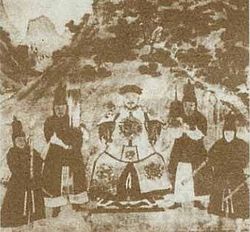Revolt of the Three Feudatories
| Revolt of the Three Feudatories | ||||||||||
|---|---|---|---|---|---|---|---|---|---|---|
 Wu Sangui (center) was one of the three rebel leaders |
||||||||||
|
||||||||||
| Belligerents | ||||||||||
|
|
Three Feudatories Kingdom of Tungning |
Chinggisid Chahar Mongol rebels | ||||||||
| Commanders and leaders | ||||||||||
|
|
Wu Sangui Wu Shifan Geng Jingzhong Shang Zhixin Zheng Jing |
Borni (Burni) Abunai Lubuzung |
||||||||
| Strength | ||||||||||
| Mostly Han Chinese Green Standard Army troops, Eight Banners | Han rebels | Chahar Mongols | ||||||||
The Revolt of the Three Feudatories (Chinese: 三藩之亂) was a rebellion lasting from 1673 to 1681 in the Qing dynasty (1644–1912) during the early reign of the Kangxi Emperor (r. 1661–1722). The revolt was led by the three lords of the fiefdoms in Yunnan, Guangdong and Fujian provinces against the Qing central government.
In the early years of the Qing Dynasty during the reign of the Shunzhi Emperor, the central government's influence was not strong enough and the rulers were unable to control the provinces in southern China directly. The Qing government initiated a policy of "letting the Han Chinese govern the Han Chinese" (以漢制漢), which was to allow some surrendered generals from the former Ming Dynasty to help them govern the provinces in the south.
In 1655, Wu Sangui was granted the title of "Pingxi Prince" (平西王; "West Pacifying Prince") by the Qing government and granted governorship of the provinces of Yunnan and Guizhou. Shang Kexi and Geng Zhongming were granted the titles of "Pingnan Prince" and "Jingnan Prince" (both mean "South Pacifying Prince") respectively and were put in charge of the provinces of Guangdong and Fujian. After Geng's death, his son Geng Jimao inherited his father's title and fiefdom, and Geng Jimao was later succeeded by his son Geng Jingzhong. The three lords had great influence over their lands and wielded far greater power than any other regional or provincial governors. They had their own military forces and had the authority to alter tax rates in their fiefs.
Zheng Jing, ruler of the Kingdom of Tungning in present-day Taiwan, also participated in the rebellion in the name of "opposing Qing to restore Ming" (反清復明).
...
Wikipedia
